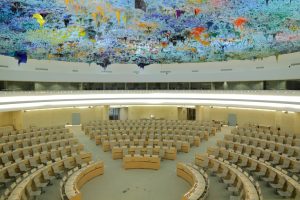Vietnam has been elected to a three-year term on the United Nations Human Rights Council (UNHRC), despite its own gross and obvious transgressions of human rights principles. In a vote yesterday, Vietnam received 145 of 189 valid votes, becoming one of 14 countries elected by members of the U.N. General Assembly in New York to a three-year term on the council beginning on January 1, 2023.
As Radio Free Asia reported yesterday, Vietnam’s election followed “an intense propaganda and lobbying drive to support its effort to be elected,” much of which was presumably aimed at reconciling the contradiction between its council bid and its own harsh treatment of political dissidents and human rights advocates.
Over the past few years, Hanoi has waged an intensifying crackdown on independent journalists, political activists, and ordinary social media users for crimes as varied as “abusing democratic freedoms to infringe upon the interests of the state” and spreading “anti-state” content online. A recent gambit has been to charge and imprison environmental defenders and political advocates on charges of tax evasion.
The Vietnamese government’s prioritization of state security over human rights was highlighted by reports that emerged this week concerning the imprisoned blogger and human rights activist Huynh Thuc Vy. In recent days, the family of the 37-year-old, who is serving a 33-month prison term for “offending the national flag” under Article 276 of Vietnam’s criminal code, has claimed publicly that she has been grossly mistreated in custody. According to the family, during a recent family visit to Gia Trung prison in Vietnam’s Central Highlights this month, Vy reportedly whispered to her six-year-old daughter that she was beaten and choked in prison.
On Monday, four prominent international human rights groups issued a joint statement making what one can only describe as a fruitless call for Vietnam to finally see the light.
“Viet Nam must immediately commit to taking concrete steps to improve its human rights performance, including by releasing arbitrarily detained human rights defenders, including journalists, ensuring the rights to freedom of expression and association, and improving cooperation with international human rights mechanisms,” the organizations said. “Such steps would be needed for Viet Nam to become a credible member of the Council.”
In many ways, Vietnam’s election to the UNHRC speaks to structural problems in the current international human rights regime – in particular, the difficulty of institutionalizing human rights norms in a state-based international system in which a majority of states are skeptical about the notion that individual rights override the principle of state sovereignty.
Among the current 47 members of the UNHRC are Cuba, Eritrea, Venezuela, Sudan, Qatar, and Libya, as well as abiding human rights skeptics India and Malaysia. Even those nations that are generally better at protecting and promoting human rights, such as the United States, very often refuse to accept the Council’s purview over their own domestic affairs. Prior to its expulsion in April, Russia enjoyed a seat on the UNHRC.
Vietnam’s election to the U.N.’s apex human rights body is unfortunately no surprise and is consistent with a long tradition of hypocrisy that has seen all but the absolute worst and most tyrannical states serve terms on the Council. But given the absence of any substantial international consensus around human rights principles, despite many nations having signed supposedly binding U.N. conventions, such outrages are likely to be a feature of the Council’s work for a long time to come.

































